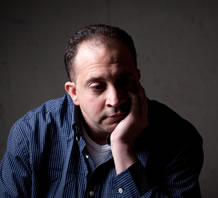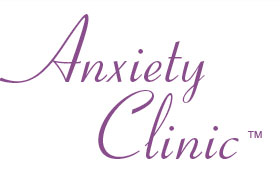Anxiety Disorder
Do you have an anxiety disorder?
Any anxiety disorder can be successfully treated. On this page you'll learn not only which anxiety disorder symptoms you have but also how these anxiety disorder symptoms manifest and cycle. We'll explain specifically why many anxiety disorders are resistant to conventional treatment and also how our ground-breaking approach to treating both anxiety disorders and the resultant symptoms succeeds time after time.
If you're looking for information on anxiety disorders you'll find it below. However if you've already had enough of suffering with anxiety disorder symptoms and are ready to do something about it - you should go straight to our anxiety treatment page.
What is an anxiety disorder and what does it entail?
Anxiety disorders encompass a wide group of conditions, each with different characteristics and associated problems. However, generally speaking all anxiety disorders are driven by the same thing.
In its place anxiety is actually a useful thing to have. It is designed to naturally enhance your awareness and physical performance for short periods of time. Ideally anxiety is triggered by potentially challenging, threatening or dangerous situations and this is where it could potentially get you out of trouble or even save your life.
However, sometimes the human mind perceives challenge, threat or danger when it is not actually there. This automatically triggers the anxiety response. When the anxiety response is triggered numerous physical changes take place in your body including an increased heart-rate, increased blood pressure, changes in breathing, a tightening of the chest and often feeling the need to flee or escape. These changes are just the most common ones and there are plenty of others you may suffer from.
An anxiety disorder is like an anxiety habit which has spiralled out of control. The more anxious you feel, the more likely your mind will perceive things as challenging, threatening or dangerous.
There are many types of anxiety disorder, with each one having its own characteristics. For example social anxiety disorder causes the sufferer to feel threatened by (harmless) social situations. Body dysmorphic disorder causes the sufferer to feel anxious about a specific part (or parts) of their body. OCD (obsessive compulsive disorder) is characterised by obsessive anxious thoughts often leading to compulsive behaviours. There are plenty more anxiety disorders too, but the purpose of this page is to offer general anxiety disorder information and help.
If you'd like more information on a specific anxiety disorder we have other dedicated pages that will prove helpful. The new page will open in a separate window.
Post Traumatic Stress Disorder
If you're still reading then let's continue helping you to understand anxiety disorders in general...
How does an anxiety disorder work?

We've already discussed that anxiety disorders are like a bad habit - namely where the body repeatedly feels anxious often when there is no genuine threat or danger.
It would be easy to assume that anxiety is always stimulated by outside events such as having to walk along a dimly lit alley at night or walking past a particularly vicious looking dog. However, in reality how often do you face genuine danger? If you're honest your answer is probably 'not very often'. This begs the question - where does the anxiety come from?
The answer is very simple. Anxiety is more often than not created internally by our thought processes. Once again you need to be honest and ask yourself how often your thoughts make you feel anxious rather then actual events.
A typical example we hear at our Clinic is from people who are anxious about flying. They tell us that literally weeks before they're due to go on holiday they're dwelling on the flying and feeling anxious. Many of these people are 50 miles from the nearest plane and are weeks away from flying, but as they feel threatened by getting on a plane (in the future) their thought processes trigger the anxiety response. The brain does not differentiate between thoughts and reality when it comes to triggering emotions and physical responses - to the mind it's all real and happening in the moment.
Anxiety disorders are born out of the above process becoming a habit. Your mind actually gets used to thinking in a certain way and before you know it... you have an anxiety disorder.
So how can you recover from an anxiety disorder? Well before we explain that, it's important you understand what doesn't work and why. Understanding what doesn't work will help you to make a more educated decision and hopefully it'll save you time and disappointment when deciding what course of action to take.
Why anxiety disorders are resistant to medication.

Anxiety disorders are traditionally treated in two ways. By far the most common method is medication. You may assume that as medication is so commonly prescribed for anxiety that it is the best option... however the truth is very different.
Medication is commonly prescribed for two reasons - neither of which are in your interest. The first reason medication is prescribed for anxiety is that it's 'quick and convenient' for your doctor. An average GP has seven minutes with you and in that time they need to be seen to do something to help. In many ways the system ties their hands - they simply don't have time to go into detail or find out what the real problem is. However, as mentioned before, this isn't in your interest and shouldn't be your problem!
The second reason for prescribing medication for anxiety disorders is 'money'. The drugs industry is hugely profitable and a portion of those profits (in the right pockets) ensures that our medication culture stays the way it is. There are other profiteers along the way, such as your GP. They get paid for putting that prescription in your hand. A month later you put in a request for a repeat prescription and your GP gets paid again (for the same problem they haven't sorted out) and the cycle continues. After a few months you'll be called in by your GP for a medication review where they'll ask you if you're OK and yes you've guessed it - they get paid again
The reason people stay on anti-anxiety medication for so long is simple - it doesn't fix the problem. Anti-anxiety medication (and anti-depressants) chemically shut down certain functions within the brain, which let's face it - doesn't sound too healthy. This effectively suppresses your ability to think and function. The drugs can indeed cause certain emotions to be suppressed whereas other drugs essentially dope people into a state of not caring about anything. However, either way the cause behind the anxiety disorder (the thing that makes it happen) hasn't been addressed at all. Thus if you ever come off the medication you'll be back to square one or possibly worse...
Of course this is no accident. A drugs company is there to profit from your condition - not cure it. A drugs company does not make money from a healthy (or cured) person. Their profits come from maintaining your condition by making it a little less unpleasant than it would otherwise be without their drugs. It's also no accident that ordinary people (just like you) become dependent on such medication. We can pretty much guarantee that if you become addicted to prescription medication the medical profession nor the dugs company will accept responsibility - you'll be on your own.
We work with many excellent GP's and it's not our intention to blame them personally or professionally. It is the system which ties the GP's hands and essentially forces them to comply. However, if you're going to take the drugs route - be careful.
Why anxiety disorders are resistant to counselling.
If you're lucky (or very insistent) your GP may refer you on to a talking therapy.
There's a lot of misinformation and inaccurate assumptions when it comes to talking therapies so we'll briefly explain how things work. There are three main referrals a GP can make in terms of talking therapies:
1. The Psychologist. If you're hoping a psychologist is going to help you to recover - you're going to be disappointed. A psychologist is there to ask questions, collate information and prepare reports... not fix problems. Generally speaking a psychologist will see you for several sessions and ask lots of questions. They will collate the information you give them and prepare a report for your doctor or specialist. That's the limit of their job.
2. The Counsellor. Counselling is great for many things, but not anxiety disorders. The reason is very simple. Counselling relies upon using logic and perspective to convince the client into recovery. If your anxiety disorder was based upon logic then counselling would be ideal - but it isn't, anxiety is an emotion.
Imagine your 16 year old daughter has recently fallen for a 22 year old thug. He has no job, no money, no qualifications, a criminal record, a drink problem, a drugs problem and several offspring scattered around the city he doesn't care for. You give your daughter all your logical reasons why she should split with the thug, but alas she turns to you and says "but I love him". Is she really going to be swayed by your logic, or does emotion override logic?
This is what we mean by trying to use logic on an emotional problem like an anxiety disorder. There are plenty of great counsellors out there, but their tools are generally not effective for this sort of problem.
3. The Cognitive Behavioural Therapist. This is your best bet for genuine help through your GP. These therapists are thin on the ground and often have huge waiting lists. However, if you genuinely can't afford to go private or refuse on principle to pay for health care - then CBT is your best NHS option. Be aware (if you're trying to do things on the cheap for the sake of it) that NHS CBT is limited to 'evidence based' technology. This means that if it's not scientifically proven - they wont use it. In our experience (as a private provider) this equates to dismissing the vast majority of the best and most effective techniques available. Once again, we're not saying anything bad about NHS cognitive behavioural therapists other than their hands are tied through (somewhat backward) NHS policy.
In essence if you genuinely can't afford to go private, CBT through the NHS is the next best thing.
Genuine anxiety disorder treatment.

The only genuine way to treat an anxiety disorder is at its source. This means that we need to address the problem habitual thought processes which are constantly triggering your unpleasant emotional states.
As previously mentioned, simply using logic to try and reason things out isn't enough. You've probably already tried to rationalise your problem yourself and realised although it doesn't really make much logical sense - it still wont go away!
What you need are specific tools and techniques that CHANGE the way your unwanted thought processes work. Altering the thought processes at their source simply dissipates the unpleasant emotions you feel. It may sound far-fetched, but that's simply the way the mind and emotional system functions. Recovery from any anxiety disorder can be relatively straight-forward... but only if you approach it in the right way with the correct tools and techniques.
At the Anxiety Clinic we have been successfully treating clients (just like you) for over fifteen years with these very tools and techniques. The truth is, you can have your life back in a matter of weeks... but sitting back, feeling sorry for yourself and making excuses isn't going to get you there.
The only difference between you and one of our now recovered clients is that they took action to help themselves. What are you going to do?
Serious about recovery? - What to do now...

If you're serious about recovery and getting your life back - we can help you regardless of where you're located in the UK. Although we run an established Anxiety Clinic in Staffordshire where we work with clients face to face, we also offer Online Consultations for clients who live further afield. These Online Consultations are with the same Specialist Consultants you would be working with if you came to our Clinic in person. However, working Online gives you all the benefits of their expertise without having to travel.
We also offer a zero risk guarantee if for any reason you're not completely satisfied with your Initial Consultation. All you need to do at the end of your Initial Consultation is tell us you're not happy to continue working with us, we'll write off the charge for that session and you'll owe us nothing. It's that simple. We have an excellent reputation to maintain so we only want you to work with us if you're entirely happy to do so.
Perhaps the next question you should ask yourself is - "What do I have to lose?"
Whilst you ponder that thought, have a look at one of the following links:
I'm interested in Face to Face Consultations at the Anxiety Clinic (In Staffordshire)
I can't get to Staffordshire - I'm interested in Telephone/Online Consultations (Nationwide)







